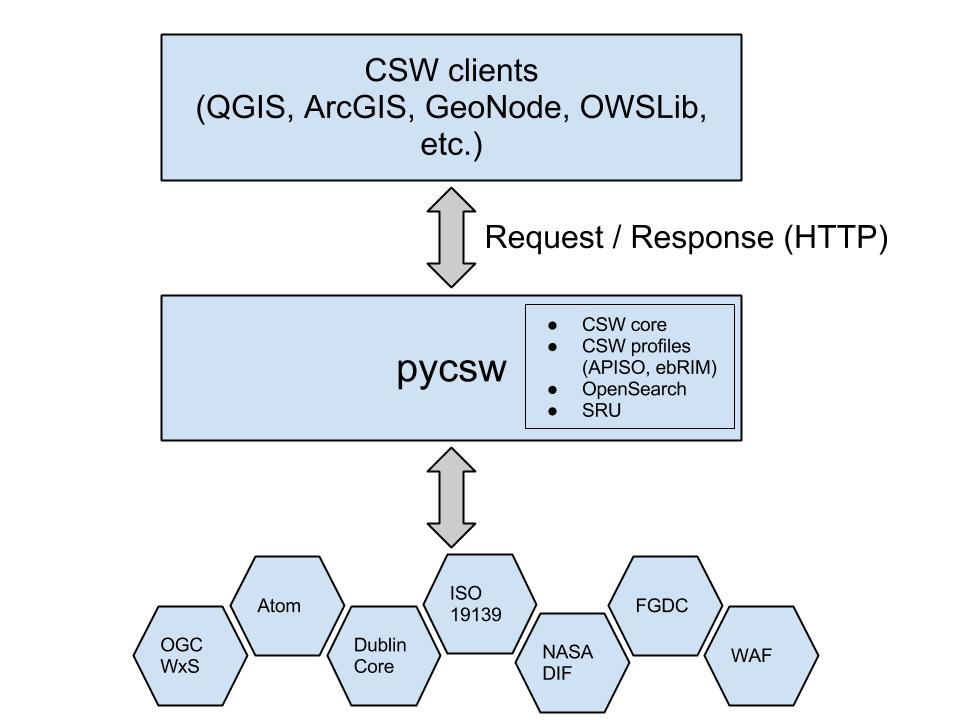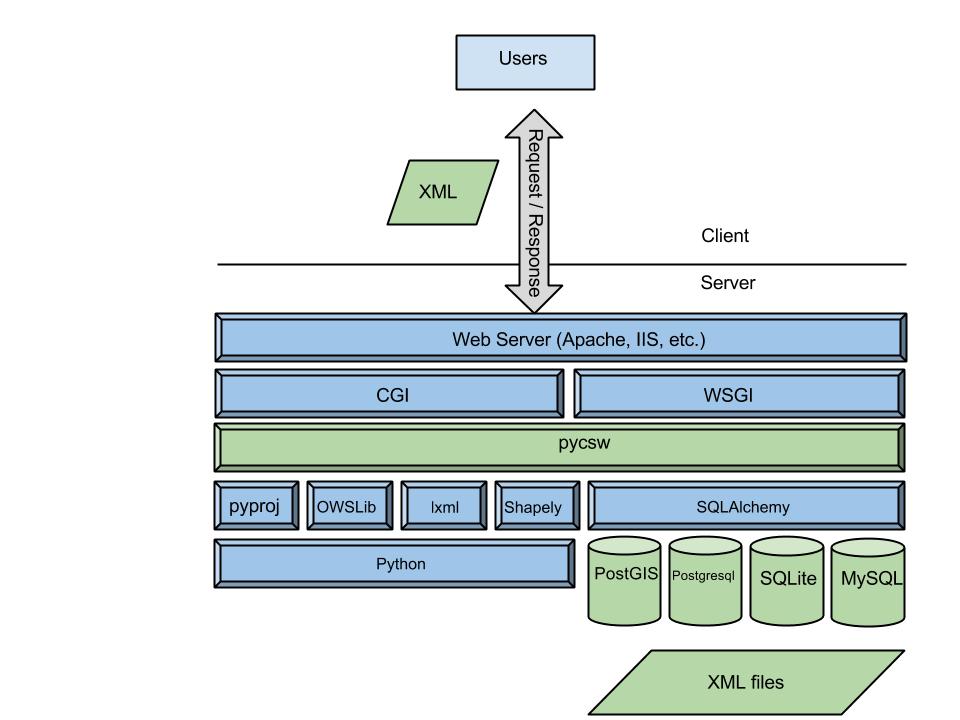Towards pycsw 2.0: Project report

Outline
- Introduction to pycsw
- Features
- What's new in pycsw 2.0
- Architecture
- Installation
- Downstream Projects and Deployments
- Future Developments
- Community
Introduction
Introduction
- pycsw is a OGC CSW server implementation written in Python
- Open Source project released under the MIT license
- Runs on all major platforms (Windows, Linux, Mac OS X)
- OSGeo Project since 11 March 2015
Introduction
- pycsw fully implements the OpenGIS Catalogue Service Implementation Specification [Catalogue Service for the Web]
- pycsw also implements OpenSearch, OAI-PMH, SRU
- pycsw allows for the publishing and discovery of geospatial metadata
Introduction
The project is certified OGC Compliant, and is an OGC Reference Implementation for both CSW 2.0.2 and 3.0.0
pycsw is an official OSGeo Project
Project History
- 2010: Development started by Tom Kralidis
- Feb 2011: Project officially announced
- Apr 2011: First official release (0.1) was released and already passed all CITE tests
- Jul 2011: Version 1.0 released
- Feb 2012: pycsw included in OSGeoLive
- Jan 2013: pycsw 1.4 certified as OGC Compliant
- Apr 2013: pycsw entered OSGeo Incubation
- Feb 2014: pycsw powers data.gov
- Mar 2015: pycsw graduates OSGeo Incubation
- Jul 2016: Latest stable release (2.0.0)
- Jul 2016: Reference implementation of OGC CSW 3.0.0
Goals
- Lightweight and easy to setup: a standalone catalogue, no GUI or metadata editing front end, designed for the use case of exposing ready-to-go metadata (files or in existing DB) through a CSW interface
- Extensible: the ability to add metadata formats and mapping them to a common information model and core/additional queryables
- OGC compliant: always pass CITE tests
Features
Features
- Certified OGC Compliant and OGC Reference Implementation for both CSW 2.0.2 and CSW 3.0.0
- Harvesting support for WMS, WFS, WCS, WPS, WAF, CSW, SOS
- Implements ISO Metadata Application Profile 1.0.0
- Implements FGDC CSDGM Application Profile for CSW 2.0
- Implements OGC OpenSearch Geo and Time Extensions
- Implements INSPIRE Discovery Services 3.0
- Supports ISO, Dublin Core, DIF, FGDC, Atom and GM03 metadata models
- Standalone of embedded deployment (CGI or WSGI)
- Transactional capabilities (CSW-T)
- Flexible repository configuration (SQLite, PostgreSQL, PostGIS, MySQL)
- Federated catalogue distributed searching
- Python 2 and 3 compatible
More features...
- Simple configuration
- Extensible plugin architecture (profiles, repositories/backends)
- Seamless integration with Python environments (e.g. GeoNode, HHypermap, Open Data Catalog)
- Integration with CKAN through ckanext-spatial and ckanext-publicamundi
- Includes commandline utility to administer the metadata repository
- Implements the Search/Retrieval via URL (SRU) search protocol
- Implements Open Archives Initiative Protocol for Metadata Harvesting
- Implements Full Text Search capabilities
- Realtime XML Schema validation
Standards Support
- OGC CSW 2.0.2, 3.0.0
- OGC Filter 1.1.0, 2.0.0
- OGC OWS Common 1.0.0, 2.0.0
- OGC GML 3.1.1
- OGC SFSQL 1.2.1
- Dublin Core 1.1
- SOAP 1.2
- ISO 19115 2003
- ISO 19139 2007
- ISO 19119 2005
- NASA DIF 9.7
- FGDC CSDGM 1998
- SRU 1.1
- OAI-PMH 2.0
- OGC OpenSearch 1.0
Supported CSW Operations
- GetCapabilities
- DescribeRecord
- GetRecords
- GetRecordById
- GetRepositoryItem
- GetDomain
- Harvest
- UnHarvest
- Transaction
What's new in pycsw 2.0.0
OGC CSW 3.0.0
- OGC released Catalogue Service Standard v3.0 on 12 July 2016
- Version 3.0 better aligns with newer OGC standards (such as OWS Common 2.0 and Filter 2.0)
- Provides a developer-friendly OpenSearch Geo API
- Supports querying via temporal extents
- Improves distributed search to better federate catalogues
- OGC blogpost on CSW 3.0
OGC CSW 3.0.0
CSW 3.0.0 provides major features and improvements over CSW 2.0.2 as part of the evolution of OGC Catalogue Services, including Open Search Geo and Time Extensions, OpenSearch 1.1, and the Atom Syndication Format.
Other enhancements include:
- Features advertised as conformance classes
- Simpler KVP API
- Enhanced distributed searching functionality
- Raw metadata response for GetRecordById
- Proper use of HTTP status codes
- Proper use of HTTP request/response headers
- UnHarvest operation
- Use of temporal predicates for query and presentation
OGC CSW 3.0.0
- OGC provides a CSW 3.0 compliance test suite
- The compliance suite was developed in 2015, while the specification was under review
- pycsw 2.0 was also mainly developed in 2015, in parallel with the compliance suite
- pycsw 2.0 development contributed to bug fixes and improvements to the OGC compliance suite
- pycsw development branch was the first to fully pass the compliance test
- Two reference implementations were available at release time
OGC CSW 3.0.0
- In alignment with the CSW specifications, the default version returned is the latest supported version
- pycsw 2.0 will always behave like a 3.0.0 CSW unless the client explicitly requests a 2.0.2 CSW
- The new default behaviour breaks the pycsw API compatibility (
pycsw.server.Csw.dispatch_wsginow returns the HTTP status code along with the response string) - More details on the pycsw RFC for CSW 3.0 support
OGC CSW 3.0.0
http://localhost/csw # returns 3.0.0 Capabilities
http://localhost/csw?service=CSW&request=GetCapabilities # returns 3.0.0 Capabilities
http://localhost/csw?service=CSW&version=2.0.2&request=GetCapabilities # returns 2.0.2 Capabilities
http://localhost/csw?service=CSW&version=3.0.0&request=GetCapabilities # returns 3.0.0 Capabilities
OGC OpenSearch
- The OGC OpenSearch Geo and Time Extensions 1.0 standard provides a lightweight mechanism to query a catalogue via HTTP GET for simple spatial and temporal searches
- pycsw supports OGC OpenSearch since 1.10.0
- OGC OpenSearch is now tightly integrated in CSW 3.0 specification
OGC OpenSearch
To query pycsw via OpenSearch, requests must be specificed with mode=opensearch. The following parameters are supported:
- {searchTerms} (keywords)
- {geo:box} (bounding box of minx,miny,maxx,maxy)
- {time:start} and {time:end} (temporal)
OGC OpenSearch
Some examples:
- Autodiscovery: http://catalog.data.gov/csw?mode=opensearch&service=CSW&version=2.0.2&request=GetCapabilities
- Keywords: http://catalog.data.gov/csw?mode=opensearch&service=CSW&version=2.0.2&request=GetRecords&elementsetname=full&resulttype=results&typenames=csw:Record&q=idaho
- BBOX: http://catalog.data.gov/csw?mode=opensearch&service=CSW&version=2.0.2&request=GetRecords&elementsetname=full&resulttype=results&typenames=csw:Record&bbox=-140,20,-40,40
- Temporal Extent (range): http://catalog.data.gov/csw?mode=opensearch&service=CSW&version=2.0.2&request=GetRecords&elementsetname=full&resulttype=results&typenames=csw:Record&time=2001/2004
OGC OpenSearch
More examples:
- Temporal Extent (since 2004): http://catalog.data.gov/csw?mode=opensearch&service=CSW&version=2.0.2&request=GetRecords&elementsetname=full&resulttype=results&typenames=csw:Record&time=2004/
- Keywords and Bounding Box: http://catalog.data.gov/csw?mode=opensearch&service=CSW&version=2.0.2&request=GetRecords&elementsetname=full&resulttype=results&typenames=csw:Record&q=vegetation&bbox=-140,20,-40,40
- More examples here
Python 3 support
- Support for Python 3 through usage of __future__ and six library
- Needed to heavily review list usage, since Python 3 added support for sorted lists
- Only support Python 3 after 3.4
- Continous integration through Travis now includes Python 2.6, 2.7 and 3.4
Better JSON support
- Implemented with xmltodict which provides parsing/serialization support in a manner which provides a closer mapping to / from an XML content model
- More compact JSON output (~30% reduction in payload size)
- Closer representation / better transformation of native XML
- Easier for downstream applications to process
Better JSON support (before)
{
"tag": "csw30:SummaryRecord",
"children": [
{
"text": "urn:uuid:19887a8a-f6b0-4a63-ae56-7fba0e17801f",
"tag": "dc:identifier"
},
{
"text": "Lorem ipsum",
"tag": "dc:title"
},
{
"text": "http:\/\/purl.org\/dc\/dcmitype\/Image",
"tag": "dc:type"
},
{
"text": "Tourism--Greece",
"tag": "dc:subject"
},
{
"text": "image\/svg+xml",
"tag": "dc:format"
},
{
"text": "Quisque lacus diam, placerat mollis, pharetra in, commodo sed, augue. Duis iaculis arcu vel arcu.",
"tag": "dct:abstract"
}
]
}
Better JSON support (after)
"csw30:SummaryRecord": [
{
"dc:identifier": "urn:uuid:19887a8a-f6b0-4a63-ae56-7fba0e17801f",
"dc:title": "Lorem ipsum",
"dc:type": "http:\/\/purl.org\/dc\/dcmitype\/Image",
"dc:subject": "Tourism--Greece",
"dc:format": "image\/svg+xml",
"dct:abstract": "Quisque lacus diam, placerat mollis, pharetra in, commodo sed, augue. Duis iaculis arcu vel arcu."
}
More pycsw 2.0.0 features
- WMTS harvesting support
- XML output improvements
- GM03 support for Swiss metadata
- Added temporal extent support to WMS layer harvesting
Architecture
Component Architecture

Software Architecture

Installation
Installation: the proper way
- Python Package Index (PyPi)
- Debian (non-free due to the OGC schema licensing: link1 link2)
- Ubuntu
- openSUSE Application:Geo
- Source code available on GitHub
Installation: 4 Minute Install
# Setup a virtual environment:
$ virtualenv pycsw && cd pycsw && . bin/activate
# Grab the pycsw source code:
$ git clone https://github.com/geopython/pycsw.git && cd pycsw
$ pip install -e . && pip install -r requirements-standalone.txt
# Create and adjust a configuration file:
$ cp default-sample.cfg default.cfg
$ vi default.cfg
# adjust paths in
# - server.home
# - repository.database
# set server.url to http://localhost:8000/
# Setup the database:
$ pycsw-admin.py -c setup_db -f default.cfg
# Load records by indicating a directory of XML files, use -r for recursive:
$ pycsw-admin.py -c load_records -f default.cfg -p /path/to/xml/
# Run the server:
$ python ./pycsw/wsgi.py
# See that it works!
$ curl http://localhost:8000/?service=CSW&version=2.0.2&request=GetCapabilities
OSGeo-Live
- pycsw is available to test in OSGeoLive since version 5.5
- Project Overview and Quickstart Tutorial are included
Downstream Projects and Deployments
GeoNode
Open Source Geospatial Content Management System
- GeoNode is a web-based application and platform for developing geospatial information systems (GIS) and for deploying spatial data infrastructures (SDI).
- pycsw is embeded and enabled as the default CSW server
CKAN
- An Open Source Data Management System for powering data hubs and data portals
- Publishing, sharing, finding and using data
- pycsw is embeded in spatial extension (ckanext-spatial)
- Tight integration implemented in PublicaMundi extension
Open Data Catalog
- Code For America Application
- Open data publishing
- pycsw is embeded and enabled out of the box
HHypermap (Harvard Hypermap)
- HHypermap (Harvard Hypermap) Registry is an application that manages OWS, Esri REST, and other types of map service harvesting, and maintains uptime statistics for services and layers
- pycsw 2.0.0 is embedded
Boundless Exchange
- Boundless Exchange is a web-based GIS platform. It facilitates the creation, sharing, and collaborative use of geospatial data
- Boundless Exchange is built on top of GeoNode, pycsw, HHypermap, GeoGig and GeoServer
Data.gov
- US Government Open Data portal is based on CKAN
- Since 2014 pycsw is deployed as the data.gov CSW implementation serving 2 million datasets
Recent Deployments
- Land Information New Zealand (https://data.linz.govt.nz/)
- Harvard Hypermap (http://hh.worldmap.harvard.edu)
- geopole.org (http://geopole.org)
- NOAA (data.noaa.gov)
- DOI (data.doi.gov)
- US Department of State (geonode.state.gov)
- PacIOOS (pacioos.org)
- Geodata.gov.gr (geodata.gov.gr)
See more at the pycsw Live Deployments Map
Future Developments
Future Developments
- Support for GeoDCAT-AP
- Support for ElasticSearch backend
- Support for SOLR backend
- Improved testing (py.test)
Community
OSGeo Incubation process
- Incubation Application - 9 Dec 2012
- Motion to enter Incubation - Passed on 31 March 2013
- Project Status Document - Finalized on 7 Mar 2014
- Project Graduation Checklist - Finalized on 12 Feb 2015
- Project Provenance Review - Finalized on 12 Feb 2015
- Graduation Recommendation from Mentor - 14 Feb 2015
- Voting from Incubation Committee - 18 Feb 2015
- OSGeo Board approval - 5 Mar 2015
Getting Involved
Community
http://pycsw.org/community.html
Mailing List and IRC
http://lists.osgeo.org/mailman/listinfo/pycsw-devel
#pycsw and #geopython on Freenode
Source Code, Wiki, Issues on GitHub
https://github.com/geopython/pycsw
Professional support
Workshop
Oregon Coastal & Marine Data Network pycsw Workshop materials available at http://www.coastalmarinedata.net/?p=229
Workshop source code available on https://github.com/geopython/pycsw-workshop
pycsw 2.0.0 codenamed "Doug"
The 2.0.0 release is codenamed “Doug” in honour of Doug Nebert of the FGDC. Doug was internationally recognized as a champion of metadata, discovery and interoperability. Involved in numerous international standards bodies and spatial data infrastructure initiatives, Doug was one of the editors of the CSW 3.0 specification and encouraged pycsw developers to adopt and implement CSW 3.0 as part of US data.gov efforts. Doug’s vision and expertise will always be remembered and appreciated by the pycsw development team.
![This product conforms to the OpenGIS Catalogue Service Implementation Specification [Catalogue Service for the Web], Revision 2.0.2. OGC, OGC®, and CERTIFIED OGC COMPLIANT are trademarks or registered trademarks of the Open Geospatial Consortium, Inc. in the United States and other countries.](https://portal.opengeospatial.org/public_ogc/compliance/Certified_OGC_Compliant_Logo_Web.gif)
